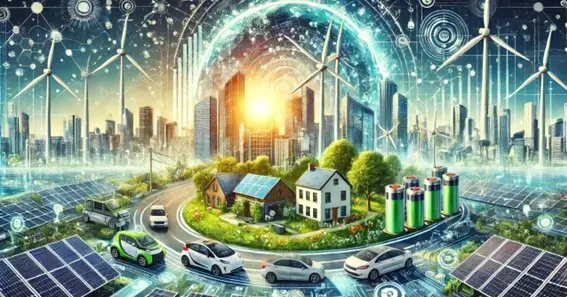The future of transportation is at a crossroads, propelled by a global transition toward a more sustainable energy landscape. As concerns about climate change and environmental degradation grow, it is unquestionably necessary to transition from traditional fossil-fuel-based transportation systems to greener, more energy-efficient alternatives. The importance of transportation in the planet’s transition to a new energy system cannot be overstated.
Adoption of Electric Vehicles (EVs)
One of the most exciting improvements in transportation is the widespread use of electric vehicles (EVs). Electric cars, buses, lorries, and even two-wheelers quickly become essential for better transportation infrastructure. Unlike typical gasoline or diesel-powered vehicles, these run on electricity from renewable sources such as wind, solar, or hydropower, resulting in significantly lower carbon emissions.
Governments and businesses worldwide are investing significantly in the infrastructure required to support EVs, such as battery advancements and charging stations. Improvements in battery capacity, energy efficiency, and charging speed all contribute to enhanced EV performance. Technological improvements are expected to reduce the cost of manufacturing EVs, making them more affordable and accessible to the average user.
Integration of Renewable Energy
Incorporating renewable energy sources into transportation infrastructure is another crucial element of the future of transportation. Although lowering emissions mostly depends on electric vehicles, their power comes from renewable sources for the best environmental impact. Making the transportation industry sustainable depends on the change toward solar, wind, and hydroelectric power to run power networks. Creating solar-powered charging stations and other clean energy-powered charging networks will be part of this effort.
Apart from lowering the carbon footprint of particular vehicles, this change helps expand green energy markets and aids the larger energy change. Transportation will be even more sustainable as renewable energy becomes more common and reasonably priced since it will allow the industry to depend on greener energy sources.
Advances in Autonomous and Connected Vehicles
The evolution of autonomous and interconnected cars also directly relates to the direction of transportation. With their artificial intelligence (AI) and machine learning powers, these cars could change travel behavior. Through best driving techniques, autonomous vehicles (AVs) are projected to improve traffic flow, lower accidents brought on by human error, and raise the energy economy. Using their connectivity, AVs can interact with other cars, infrastructure, and energy grids, enabling a more responsive and effective transportation system.
Connected cars might be set to maximize paths according to real-time traffic data, therefore lowering fuel usage and environmental effects. These technologies will be increasingly important as they develop in lowering emissions and improving transportation systems’ energy economy.
Development of Hydrogen Fuel Cell Vehicles
While electric vehicles are leading the transition to sustainable transportation, hydrogen fuel cell vehicles (FCVs) offer an option. Hydrogen-powered vehicles run on hydrogen gas, which combines with oxygen in a fuel cell to generate electricity and emits only water vapor as waste. This technology provides various benefits, including faster refilling times and longer driving distances than traditional electric vehicles.
Hydrogen FCVs are ideal for heavy-duty applications such as buses, trucks, and trains that require long-distance travel and quick refilling. Nonetheless, the widespread acceptance of hydrogen FCVs poses challenges, including the need for a robust hydrogen refueling infrastructure and the high cost of manufacturing hydrogen fuel cells.
Collaborative Efforts and Global Initiatives
The energy transition in transportation cannot be achieved by individual efforts alone. Governments, industries, and stakeholders must collaborate globally to implement policies that accelerate the adoption of clean transportation technologies. Businesses contribute significantly by investing in research and developing cutting-edge solutions to make transportation more sustainable. In this context, energy transition accelerators are vital. These include solutions that provide access to reliable resources and expertise, enabling organizations to adopt innovative technologies and green practices more effectively.
These accelerators drive faster implementation and scaling of sustainable practices, helping to bridge gaps in knowledge, technology, and infrastructure. Such collaborative efforts create the momentum needed to build a sustainable, low-carbon transportation system benefiting society and the environment.
Conclusion
The future of transportation in the energy transition context is exciting and crucial for achieving a sustainable and robust global energy system. Technologies like self-driving cars, hydrogen fuel cells, electric vehicles, and renewable energy integration will help to shape civilization as it evolves. The transition to greener transportation options will reduce dependency on fossil fuels, reduce emissions, and create new economic opportunities for green firms. Developing alternative fuels and smart infrastructure can bolster these efforts by expanding energy-efficient and environmentally friendly transportation options.










